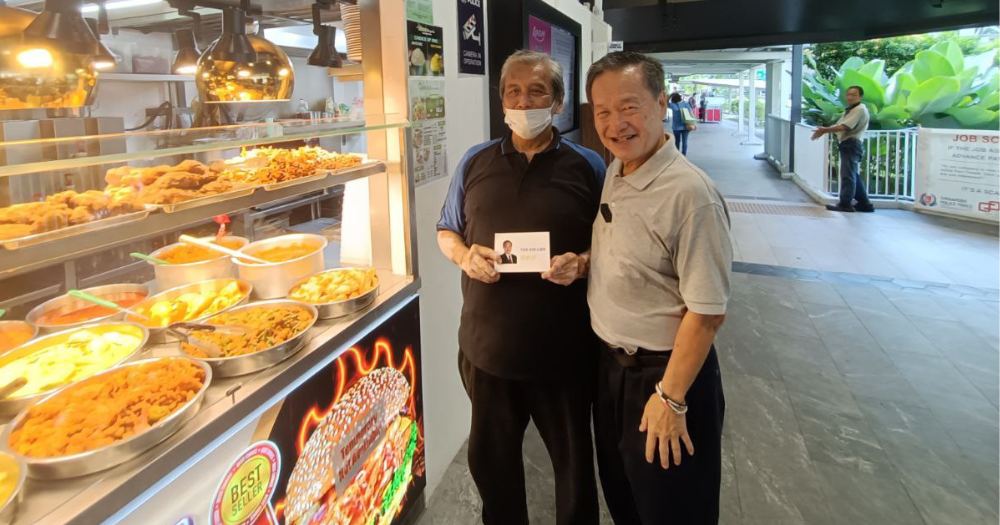The original script of presidential hopeful Tan Kin Lian for the Presidential Candidate Broadcast contained inaccuracies about the President's role, the Elections Department Singapore (ELD) and the Infocomm Media Development Authority (IMDA) said in a joint statement on Aug. 24.
According to the ELD and IMDA, Tan had specifically suggested that the President can provide guidance on the reserves’ investment strategies and influence government policy.
After being notified of the inaccuracies, Tan's election agent had corrected them without objection, they added.
The statement also highlighted that the presidential candidates were informed of the timings of the Presidential Candidate Broadcast and the rules on Aug. 12, and were briefed on Aug. 21.
All candidates were required to submit their scripts in advance, the statement added.
Tan: Removed portions were the most important parts of my speech
At a walkabout on Aug. 24 at Senja Hawker Centre, Tan said that the removed portions were the most important part of his campaign.
Tan said he had wanted to "highlight" in the removed paragraphs about an "overall investment strategy" where the country's reserves will be invested by "professional investment managers" to "achieve the desired result".
When asked about his response to being informed by his team that the inaccurate portions had been removed from his speech, Tan replied:
"I was not in IMDA. My campaign team went to IMDA. I happened to be somewhere else… I had other things to attend to. My campaign team tried to contact me. I only received the message after the IMDA deadline. I was not able to respond within the deadline."
Tan also commended his agent for using his initiative and added, "He did what needed to be done on the spot."
Tan then said:
"He didn’t reach me, he did what had to be done. He removed those three paragraphs. That’s not a problem to me. I’ve got other avenues to publicise those three paragraphs, which I’m doing today."
ELD & IMDA: Tan signed a declaration to confirm that he read about the President's role
The ELD and IMDA further added in their statement that all of the presidential candidates, including Tan, signed a statutory declaration on their nomination paper to confirm that they have read the explanatory material on the President’s constitutional role.
This includes specific examples of what the President can and cannot do.
In addition, the candidates also signed a voluntary undertaking on campaigning for the election in a manner that is "dignified, decorous and consistent" with the President’s position, the statement highlighted.
ELD and IMDA concluded, "We remind all candidates not to mislead the public about the President's role."
What exactly is the President's role?
Singapore's Constitution confers on the President a number of custodial powers which enable the President to veto certain proposed measures, notwithstanding the advice tendered by the Cabinet.
These custodial powers fall into the following three categories: Singapore's past reserves, the public service and to serve as a protective function.
Singapore's past reserves
In the case of the past reserves, the President is empowered to vet, and if he so decides, to veto measures taken by Parliament or the government that he considers would draw on past reserves.
As an example, the President can refuse to grant their assent to a supply bill passed by Parliament if he is of the opinion that the Bill would draw on the government’s past reserves.
This also extends to key statutory boards such as the Central Provident Fund (CPF) Board, the Housing Development Board, the Monetary Authority of Singapore, and key government companies such as Temasek and GIC.
The President can disapprove the budgets and transactions of these entities if he considers that they draw on the entities’ past reserves.
However, what he cannot do is decide on the investment policies of entities such as Temasek and GIC, or veto bills that increase tax rates.
Public Service
The President can veto appointments to key public offices, including the Chief Justice and the Judges of the Supreme Court, the Chief of Defence Force and the Service Chiefs of the Singapore Armed Forces, the Commissioner of Police, the Attorney-General, the Director of the Corrupt Practices Investigation Bureau (CPIB), and the Chairman and members of the Public, Judicial and Legal Service Commissions.
The President can also veto the removal of individuals from these appointments.
What the President cannot do is to appoint his own preferred candidates to these key appointments.
Serving as a protective function
Should the Prime Minister refuse to authorise an investigation by the Director of CPIB, the President can do so.
In addition, the President’s concurrence is required for a person to be detained under the Internal Security Act if the ISA advisory board recommends against the detention.
The President can also cancel or vary a restraining order made under the Maintenance of Religious Harmony Act if the Cabinet’s advice was contrary to the recommendation of the Presidential Council for Religious Harmony.
Top photo by Daniel Seow
If you like what you read, follow us on Facebook, Instagram, Twitter and Telegram to get the latest updates.



